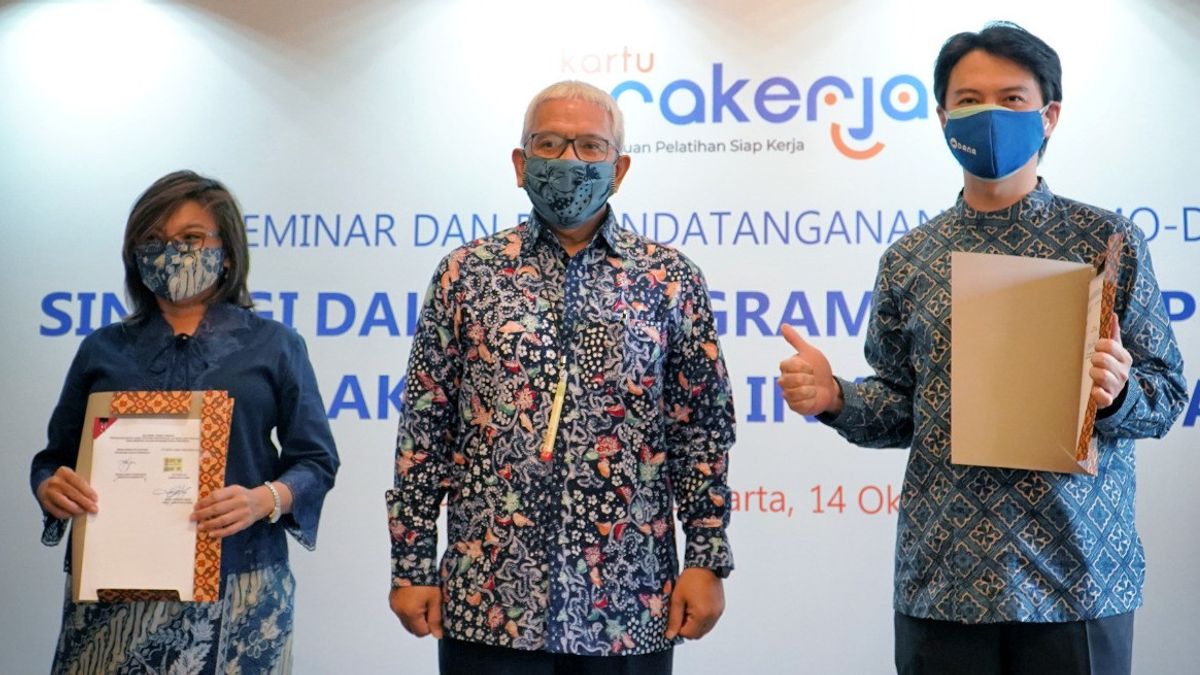JAKARTA - The government has officially partnered with the DANA digital wallet to become a payment partner in the Pre-Work Card program, following four other partners, namely PT Bank Negara Indonesia (Persero) or BNI, OVO, LinkAja, and GoPay.
Denni Puspa Purbasari, Executive Director of Executing Management for the Pre-Employment Card Program, said that this collaboration adds to the list of Pre-Employment Card payment partners, who have previously worked together to provide e-wallet accounts as a medium for distributing incentives.
"Joining DANA in the Pre-Employment Card ecosystem as a payment partner gives Pre-Work Card participants more options to which account the incentive funds will be distributed to," he said, in a written statement received by VOI , Wednesday, October 14.
Meanwhile, Deputy for the Coordination of the Digital Economy, Manpower and Micro, Small and Medium Enterprises, the Coordinating Ministry for Economic Affairs, Rudy Salahuddin said the Pre-Employment Card program was able to encourage financial inclusion.
Furthermore, he explained, financial inclusion has three important functions for the economy, namely improving people's welfare, encouraging the national economic recovery process, and supporting the people's economic resilience.
Currently, said Rudy, digital technology is increasingly needed during the COVID-19 pandemic. Now people no longer need to queue, meet face to face with officers, or go to certain offices to get services, including financial services.
"The Pre-Employment Card Program introduced in April has accelerated financial inclusion. It is proven that 4,094,136 Pre-Employment Card recipients have e-wallet accounts. The second evaluation survey conducted by MPPKP on October 4 to 7 with 160,560 respondents showed a fairly good increase in financial inclusion. , "he said.
Before joining the Pre-Employment Card Program, said Rudy, 23 percent of respondents did not have bank accounts. Currently, 44 percent of the 23 percent of respondents already have a bank account. Then, as many as 45 percent of respondents initially did not own an e-wallet . Currently, 94 percent of the 45 percent of respondents have e-wallets .
Meanwhile, said Rudy, based on the National Financial Literacy Survey (SNLIK) conducted by the Financial Services Authority (OJK), it was noted that the current level of national financial inclusion is at 76.2 percent. OJK is targeting the level of financial inclusion in Indonesia to reach 90 percent by 2024.
The government's target to increase financial inclusion is also supported by the increasing number of fintech companies in Indonesia targeting segments of the Indonesian market that are not yet reached by the financial sector.
"One of the main obstacles to increasing financial inclusion in Indonesia is closely related to the education and socialization of financial products, which are still low," he said.
The English, Chinese, Japanese, Arabic, and French versions are automatically generated by the AI. So there may still be inaccuracies in translating, please always see Indonesian as our main language. (system supported by DigitalSiber.id)













